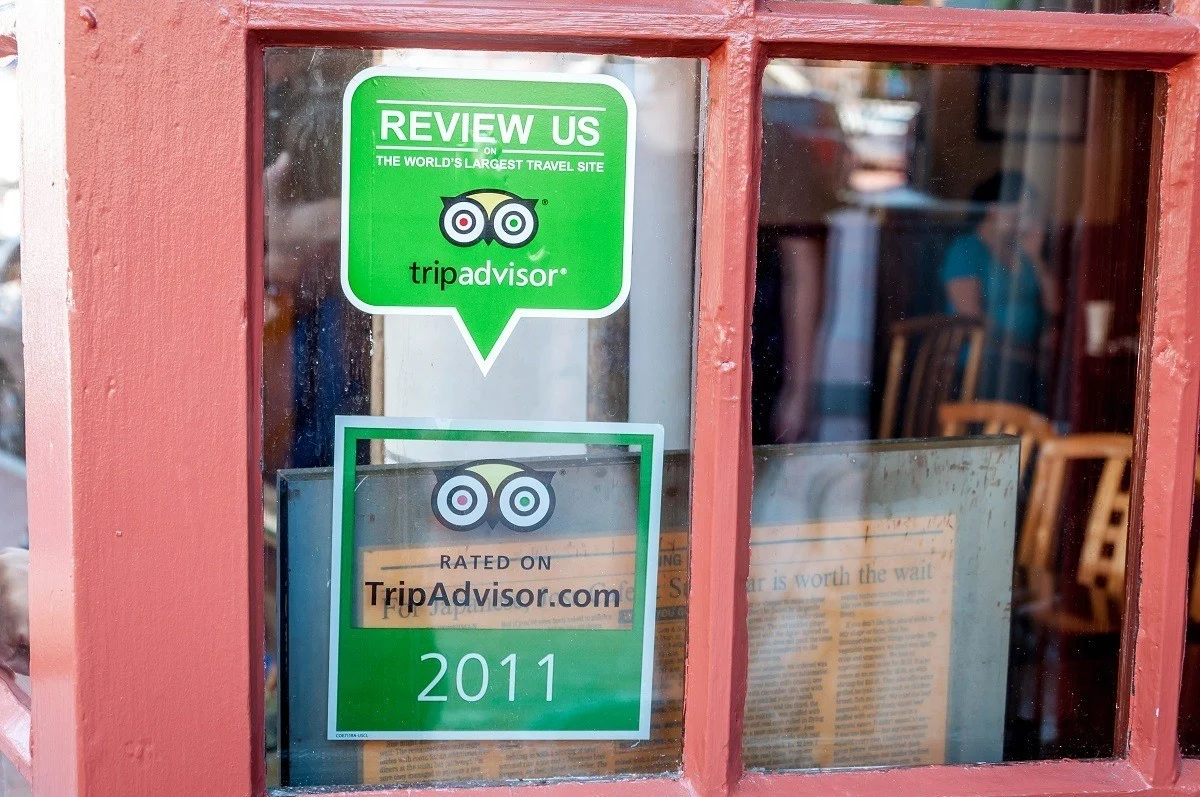
In the travel industry, nothing can touch TripAdvisor reviews. It’s the gold standard for information and comparison shopping for hotels, restaurants and excursions.
Yet, just below the surface, there are some major problems with the service. There’s a dark side that is widely discussed in the industry, but rarely acknowledged to consumers: there’s a huge problem with fake TripAdvisor reviews.
Here’s What’s Wrong with TripAdvisor Reviews
TripAdvisor Fake Reviews
The company has been embarrassed by recent exposes where a homeless shelter was propelled in the TripAdvisor rankings to become one of Britain’s top hotels or a five-star restaurant in Italy that is Michelin quality but turned out not to exist at all.
In 2017, “The Shed at Dulwich” became London’s #1 rated restaurant on TripAdvisor – only it didn’t exist. These astounding stories are rare, although they seem to be increasing in frequency.
However, much more common are the fake TripAdvisor reviews for known businesses. The site has become a place where competitors attack each other with poor ratings and business owners respond by posting their own over-the-top praise.
Since each TripAdvisor review counts equally, each one of these reviews becomes a tactical weapon in trying to inch up in the TripAdvisor star system. In 2014, the company was slapped with a $600,000 fine in Italy for fake reviews, but it doesn’t seem to have stopped the problems.

And in September 2018, a high-profile investigation by The Times of London found that one in three (33%) of TripAdvisor reviews are fake. The company has denied the results of the independent investigation. However, from our experience, this seems pretty accurate.
A second, broader independent investigation in September 2019 combed through 250,000 reviews and found 15% of them were fake. More troubling, when fake reviews were pointed out to TripAdvisor, they acknowledged that 93% of the hotels engaging in fake ratings had done it previously. Translating this, hotels engaging in this practice have been allowed to remain on the TripAdvisor site to continue engaging in the practice.
After many years, the company has quietly recognized there is a problem. In November 2018, they relaunched the platform as a kind of social network. The theory is that people will trust the recommendations of friends and family.
However, by November 2019 (just 12 months later), many of the social network elements have been rolled back and instead sponsored content from advertisers fills the space. It would seem that the “new TripAdvisor” was a failure.
The latest from the company is Tripadvisor PLUS – an expensive $99/year buying club offering people discounts on packaged travel options (not dissimilar from what other companies have offered for free for decades). Travel publication Skift has noted that the company is essentially offering, “room rates that are widely available elsewhere.” But the new Tripadvisor PLUS also nearly completely sidesteps the research/review step in travel buying.
In October 2021, TripAdvisor finally published a transparency report. They officially acknowledged that about 9% of reviews are fraudulent or biased, requiring them to be removed. It’s a global problem and they found fake reviews in 131 countries. The reality problem is still probably many times worse than the company is willing to admit. However, shockingly, the company has not changed model/addressed the root of the problem.
Very Little Quality Control
TripAdvisor seems to rely on software to “review” the reviews. Unfortunately, the software has significant limitations so the result is that there’s almost no quality control: anyone can post anything. As such, the vast majority of ratings come from one-hit wonders – people who have created the account to gripe or rave about a single particular experience (that may or may not have actually happened).
In the September 2019 investigation, 79% of the five-star fraudulent hotel reviews were left by individuals who had no other activity or ratings on the site.
As competitors wage war and businesses respond with their own fakes, you end up with a lot of contributors who have less than 5-10 reviews. Even if the review does come from a real person, atypical experiences receive disproportionate credibility.
Comparisons are Rejected
We’re a TripAdvisor “Top Contributor.” They keep sending us e-mails telling us how we rank among the elite of the elite on the site. But we’ve had many reviews rejected. Why? Those reviews have included actual useful information, such as a particular hotel being close to another business or attraction. That kind of context is frowned upon, even though it is actually useful.
Merchant May Be Gaming the System
We’ve stayed at a number of hotels where we are absolutely bombarded by the hotel management to leave positive reviews for them. We had a restaurant offer to complete the TripAdvisor review for us. On our recent trip to San Francisco, California, a restaurant offered us a complimentary glass of wine for completing a TripAdvisor review.
And one hotel in Munich, Germany went so far as to set up a computer terminal right at the front desk where if you completed the review under the watchful eye of management, you’d receive a 5% discount.
TripAdvisor is a Democracy
Every vote on TripAdvisor counts equally. This may come off as elitist, but this is the core incentive that drives fake reviewers. If TripAdvisor employed, compensated, or otherwise partnered with professional or semi-professional reviewers, much of this could be avoided. To be relevant in the future, TripAdvisor needs to drive quality, not quantity.
The idea of a “social network” was an interesting one. However, after 12 months into the new TripAdvisor experiment, the results were yet another disappointment for the company.

Negative Reviews May Be Deleted Without Reason
There have been numerous reports of negative reviews being deleted, especially if a business is a TripAdvisor advertiser or engages in pay-per-click marketing campaigns with the company. The company doesn’t want to hurt a potential advertiser or revenue source.
However, this leads consumers to an unnatural and unrealistic opinion of a property through a process of selective omission. Furthermore, legitimate warnings of unsafe properties where rapes and deaths have occurred are also deleted by the company (such as this one).
Members of Congress have taken notice and instructed the Federal Trade Commission to investigate. The chairwoman of the FTC has expressed concern over TripAdvisor’s business practices and a full investigation may already be underway. (Read more details here.)
To be fair to the company, TripAdvisor has a website statement in which they claim to have a zero tolerance for fraud.
The company finally took action in 2018 and sought criminal prosecution of a single individual in a high-profile criminal case in Italy (note: this is the same country where the company was fined in 2014). The company pressed for charges against a man who posted more than 1,000 fake reviews. The man got nine months in prison and a $9,300 fine.
But more importantly, TripAdvisor got a public relations victory in presenting an image of a company concerned by the scale and scope of the problem. TripAdvisor corporate attorney Brad Young said that this action was no less than a “landmark ruling for the Internet.”
Given the scope of the problem and how many years it has lasted, one has to wonder how many more of these cases would need to happen to truly address the issue. And no word from Mr. Brad Young on exactly when we might expect a second prosecution for fake reviews. Given the scale, scope, and severity of the fake review problem, consumers have expected a more ambitious response.
How to Use TripAdvisor
But TripAdvisor isn’t all bad. It can still be helpful if you know what to do. Here are our strategies for getting some benefit from the service.
Ignore all TripAdvisor Rankings and Star Recommendations
Use price as a guide instead. Let your budget dictate, use the search filters for things like parking or pool that may be important to you, and then drill down to read the qualitative reviews for the property.
Don’t Believe Every Qualitative Review
Ignore all reviews from reviewers that don’t have at least 50 reviews. We’ve recently started ignoring all reviewers that don’t have a minimum of 200 reviews. Travelers should also ignore all reviews from people who are from the same city where you are looking (so if you are looking at Chicago, ignore all reviews from people who list Chicago as their hometown). And ignore all reviews without a customized profile picture.
Don’t Login and Clear Your Cache Frequently
The reviews are customized based on past search behavior or marketing relationships with the company. You’ll find that the majority of the “Just For You” reviews are based on companies that pay money to TripAdvisor, not that they are places you may want to eat or stay. Clearing your cache won’t stop all of this, but it does help reduce the target marketing.
A second option is to use an incognito or private browser window (or even a VPN service). This can help provide some additional layer of anonymity.
Don’t Rely on TripAdvisor Exclusively
Use other data sources to supplement your search process. More and more, we’ve been turning to other travel blogs. They are authored by a real person who has real expertise — an authority on the topic. And a good travel article is worth more than all the generic, anonymous reviews.
However, if you have the time or inclination to wade through the clutter, there can be some value in TripAdvisor reviews.
Lance Longwell is a travel writer and photographer who has published Travel Addicts since 2008, making it one of the oldest travel blogs. He is a life-long traveler, having visited all 50 of the United States by the time he graduated high school. Lance has continued his adventures by visiting 70 countries on 5 continents – all in search of the world’s perfect sausage. He’s a passionate foodie and enjoys hot springs and cultural oddities. When he’s not traveling (or writing about travel), you’ll find him photographing his hometown of Philadelphia.





Jo
Friday 3rd of November 2023
It’s not just TripAdvisor who is unreliable. Booking.com (same company) has the same policy. I wrote some less god reviews and the owner just informed them that we never turned up and was able to delete the review. Booking.com did send an email asking if it was correct that we didn’t turn up, and we, of course denied that, but to no avail. Booking.com said in a reply that they were aware that we were denying it, but they did not post our review nevertheless.
Lance Longwell
Sunday 12th of November 2023
That's possible. However, only validated sales can review on Booking vs the anybody of TripAdvisor. So, while the data can be slightly skewed on Booking by deleting some negative reviews. However, compared to the tens of millions of fake reviews on TripAdvisor, it is a better system.
Ramesh Mehta
Tuesday 26th of September 2023
This is to inform you that in the previous size months time, I was prey by the online scam fraudsters on Telegram channel regarding fake promotion of Trip Advisor Hotels and Destinations sites. In this case, a gang of people working lure people for fake promotion and thereby giving a small token money in return as bonus. But after the paid promotion, the victims become prey and paid lacs of rupees by them without getting back the amount It is my earnest request to take appropriate action against them and do justice to the victims. I would share more information like screenshots separately in case you so desire. Thanking you, Ramesh Mehta
James King
Monday 31st of July 2023
Tripadvisor removed my review of Solmar Lands End Cabo San Lucas. In my review I complained that we were evacuated by a fire in our building, lost a night's sleep, and hotel refused a refund for the night. Why do you suppose it was removed?$
Janet Bucher
Sunday 17th of September 2023
@Lance Longwell, so what reliable unbiased sites are good to use to get info?
Lance Longwell
Tuesday 1st of August 2023
No doubt. We've noticed a real trend of the numerical scores for properties trending upwards. I'm sure deleting negative reviews helps promote that trend.
Suk
Friday 30th of June 2023
Totally agree. I submitted 2 reviews about Koh Lipe island in Thailand. One possible review it posted immediately. One negative review it never posted.
I did receive email from TripAdvisor told me to modify my review and resubmit but I am not sure what I need to change. I modified and resubmitted after 1 week, I got the same asked me to edit my review, not sure what I did wrong except negative review about the hotel. I tried the 3rd time this morning and I am sure it will never post.
Why I did that, because this hotel is totally misleading not sure how it received 4.5 starts rating, it should not receive more than 1 star. By the way, I did wrote the bad review in Google, it posted immediately,
Lance Longwell
Monday 3rd of July 2023
TripAdvisor blocks negative reviews that mention an employees name, the name of another business, anything that can be considered libelous (i.e., claiming you got sick after eating there)...and basically anything that someone would want to know. Naturally, if you post something positive (particularly if that business advertises with TripAdvisor), that will be posted immediately.
Sick and tired
Monday 26th of June 2023
I know of a local seasonal store, where the owners are here for 3 months a year. They work during the day and get drunk at night laughing hysterically challenging each other to see who can write the best reviews. About 75% of their reviews on trip advisor, google and yelp are all fake. Because of these fake reviews these two clowns have gotten a news paper article written about their great reviews and their success. They make enough in 3 months to travel all winter while They brag to everyone about how much they’re making and how little they have to work to get that money. I have written to trip advisor, google and yelp to flag some of these reviews and they do nothing about it at all.. one review was so stupid, it stated that this customers children loved going to this store/ sandwich shop so much they asked to return next year instead of going to Disney Land!!!!!! People keep reading these and keep showing up for the “best of everything”.. because they post each item they have in each review, as the “best”.. pathetic that people can get away with this. They claim that it’s ok because it’s free advertising but it’s nothing but dishonest!!!! And there’s sites should be sued for not doing their jobs better.. I think when you see a person say they went there for breakfast, lunch and dinner???? It’s a store, your on vacation where there are lots of eats around so hmmmmm .. come on now!!!